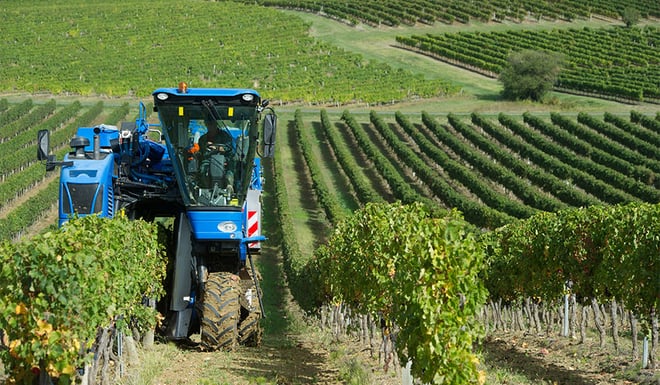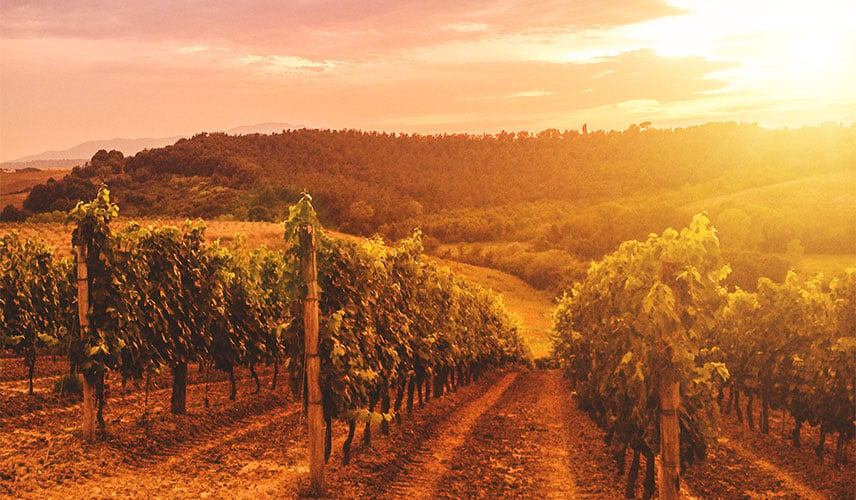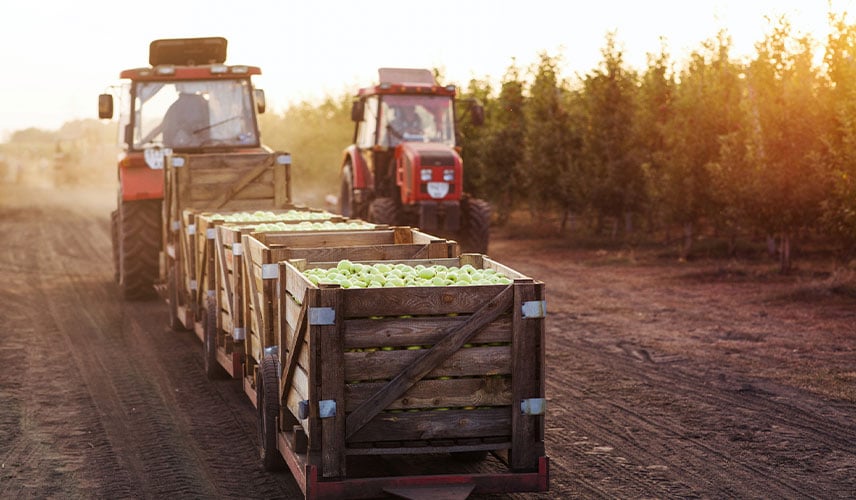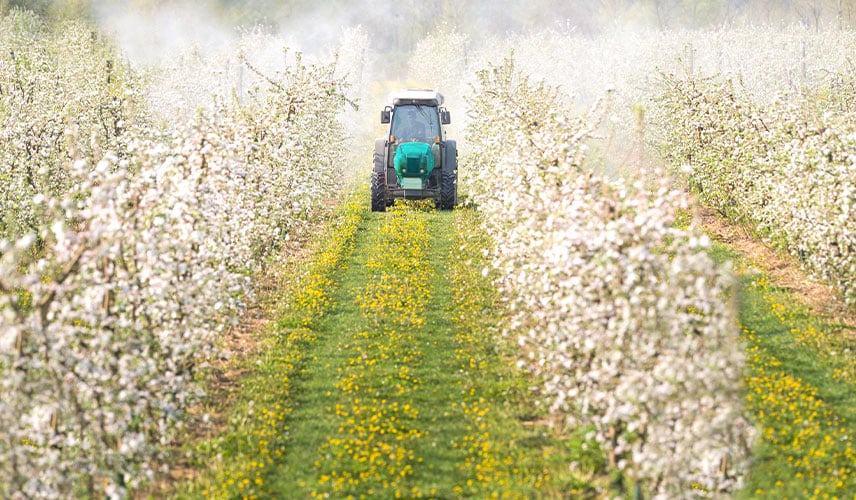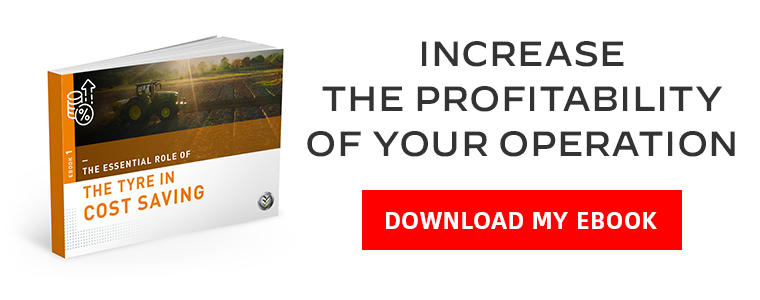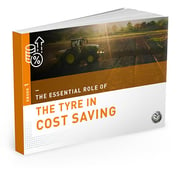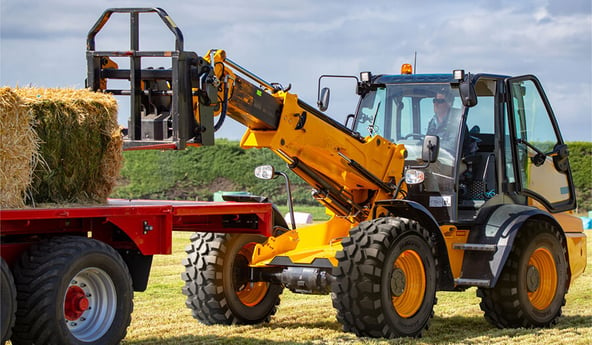Even if vines or fruit trees in the orchard have deep roots, there is also a large part of their root system which is close to the surface to capture the moisture or micronutrients present in the arable layer of the soil which is much richer than the lower layers.
The repeated circulation of agricultural machinery over the same spot over several years will compact the soil, block root development, limit biological life and reduce the water infiltration capacity.
The tyre has a crucial role to play in avoiding these soil deterioration phenomena which, in the long term, will be very detrimental to your yields. Choosing a suitable agricultural tyre for your machinery will effectively allow you to control the tyre’s working pressure and therefore minimise the pressure transferred to the ground.
It is effectively the tyre that transmits compaction to the ground and in vineyards or orchards, where the vines and trees are the same plants for dozens of years, the effect of repeated inter-row traffic, systematically in the same place, leads to very localised soil compaction.
To avoid or limit the apparition of compaction as far as possible, you must select tyres with specific features corresponding to work in vineyards or orchards.
1. Choose wider low-pressure tyres and check inflation pressure systematically
Soil compaction is one of the biggest problems affecting your long-term yields, whatever the type of crop that you grow: wheat, corn, fruit trees or vines, the process is the same.
Compaction blocks water infiltration and reduces porosity and soil aeration. The water that can no longer seep into the ground flows along the surface and washes the soil, leading to erosion and a loss of the nutritive elements that are necessary for your crops. The excess moisture content on the surface of the ground can be a source of disease and the fact that this water did not penetrate into the ground will diminish the reserves that are normally available to the deeper roots, which are essential to your crops during the dry season.
In the event of heavy rain or violent storms, there may be extensive gully erosion which may weaken the stability of the plants.
Compaction limits biological life in the soil and blocks root development in the arable layer, which is the richest in nutrients. This leads progressively to a drop in yields which tends to be attributed simply to the weather conditions at the time, whereas this is really an invisible problem of compaction which has been cumulating over several years.
Luckily, for each problem, there are solutions. To preserve your orchards or your vines against excessive soil compaction, here are the options that are available to you:
Opt for tyres that can work at a low inflation pressure
Even if vineyard tractors are lighter than the tractors used for field-crop farming, regular traffic in the narrow inter-rows leads to a high risk of compaction in very specific areas very close to the grapevines.
The pressure within the tyre is transferred to the ground. The higher the inflation pressure, the greater the extent of the compaction. Repeated circulation in the same place with unsuitable tyres will inevitably cause in-depth damage to the soil, which is why it is highly recommended to work with agricultural tyres that have been designed to work at “low pressure”.
They offer a bigger soil footprint compared to standard agricultural tyres, which makes it possible to spread the load over a larger surface area with a lower inflation pressure. Result: less soil compaction.
Check your tyre pressure systematically
It is not necessarily essential to replace all your tractor tyres with low-pressure tyres. You can keep them and adapt your pressure settings more frequently, based on your working conditions.
If the compaction is superficial, this means that your tyres do not have the right inflation pressure settings and regular adjustment of these settings should improve the situation.
You should weigh each axle and adapt your tyre pressure regularly based on the expected load, working speed and the degree of the incline, in order to take load transfer into account. In some winegrowing regions, the vines are grown very steep slopes.
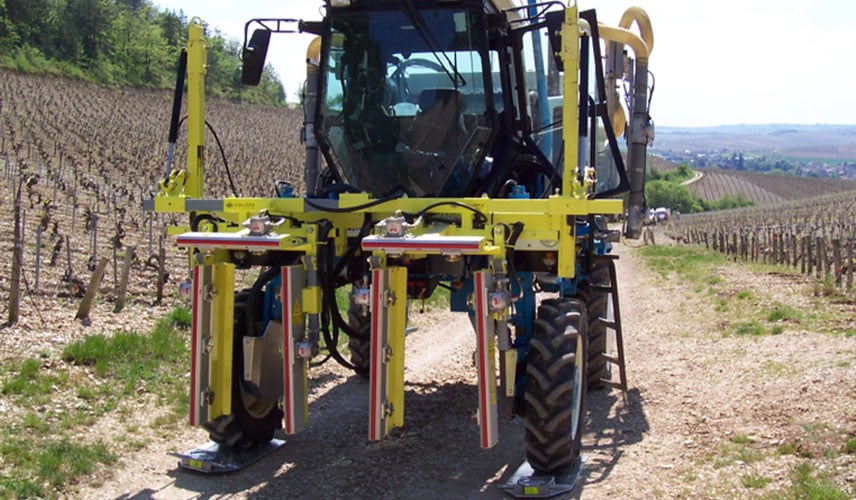 Weighing the front axle of a double-row straddle tractor
Weighing the front axle of a double-row straddle tractor
On the other hand, more in-depth compaction is essentially due to a load on the axle that is too high, requiring a higher inflation pressure to bear this load. In this case you can either reduce the load if this is possible, or you can change and opt for low-pressure equipment, wider tyres or duals.
2. Choose tyres that are adapted to winegrowing or orchard farming
Due to the specificity of each crop, you do not use the same agricultural tyres for cereal farming as you would for orchard farming or winegrowing.
The ground in vineyards or orchards is quite often dry, with steeper inclines in vineyards than for most other crops. It is therefore best to opt for a more resistant tyre and one which can work at a very low inflation pressure in order to reduce the effects of soil compaction.
VX-TRACTOR vineyard tyres:
designed for resistance at low pressure
Developed by Bridgestone, VX-TRACTOR vineyard tyres are designed for use with small to medium-power tractors.
Thanks to their reinforced casing, which is both more resistant to load and more durable, they are perfectly adapted to vineyard and orchard farming soils.
These tyres have a reinforced construction with 3 casing plies and 6 plies used to make up the tread. This heavy-duty construction makes it possible to work at an inflation pressure of between 0.6 and 2.4 bar, while maintaining good shock absorption features and flexibility in the sidewalls.
An extended lifespan
This type of tyre was developed to offer a longer lifespan than standard or discount agricultural tyres. A higher volume of rubber is effectively used in the manufacturing process, representing up to 20% more rubber.
These high-tech tyres have a tread that is more resistant to wear thanks to its exceptional composition which includes more vegetable oil, making the VX-TRACTOR tyre more resistant to cuts to the lugs.
Involute lugs to improve traction
The transmission of your tractor’s engine power to the ground is essentially the task of the tyre’s lugs. When these grip hold of the ground, there is a horizontal compaction effect in the transmission of the tractive force to the ground.
If you use a normal tyre, the lugs create a soil displacement effect when they leave the ground by lifting up the earth.
With VX-TRACTOR tyres, the tractive force is optimised thanks to the Involute lug design which significantly reduces soil disturbance thanks to the specific profile angle which ensures perfect self-cleaning of the surface of the tyre.
3. Deliberately limit traffic and choose to sow grass between the rows
When you work with the right tyre model at the right inflation pressure, you can preserve your vines or your orchards even better against excess soil compaction. You just need to adopt a few simple techniques to carry out your various tasks.
Avoid driving over waterlogged land
Driving your machines repeatedly over the same area inevitably amplifies the compaction of your soil, especially in wet conditions.
When your ground is waterlogged, it is wiser to stop work to avoid compacting your soil under the weight of the machinery.
Resistance to load on wet ground is effectively very low, with the likelihood of ruts forming. The soil will sink down until the tyres meet resistance.
These ruts will then channel the water and reduce the correct irrigation of the land. The work necessary to flatten out the ruts is time consuming and a waste of energy.
Limit the traffic or frequency of passages
As agricultural machinery has to circulate precisely in the same place between the rows, it is impossible to maintain a distance from the crops when driving. This means that soil compaction is almost systematically accentuated.
The more compacted the soil is, the more irrigation it needs, and irrigation is costly and necessitates further vehicle traffic. Nevertheless, it is possible to limit traffic by reducing the number of passages for irrigation or weeding.
Cover crops planted between the rows help prevent the rapid overheating of the soil, reduce the number of vehicle passages for irrigation purposes and improve natural water drainage.
Grass growing
To preserve the soil from compaction and avoid dry soil conditions during the hot period, the best option is to encourage plant cover. You can improve the ground bearing capacity by growing grass to create passive soil protection and an ecological niche.
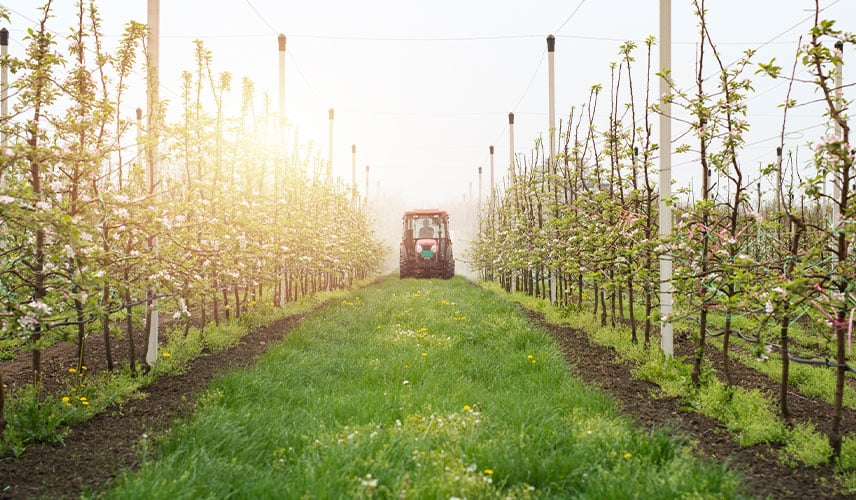 Growing grass between the rows in fruit framing
Growing grass between the rows in fruit framing
This operation contributes to the fight against erosion and makes it possible to reduce surface water run-off. Depending on what your objectives are, the grass can be permanent or temporary, sown or spontaneous:
- Temporary grass cover in vineyards: this consists in sowing annual (not perennial) grass seeds which are planted on the compacted soil to obtain maximum biomass concentration. This technique produces soil that is more alive and more resilient by decompacting it and allowing the oxygen in.
- Permanent grass cover: this consists in sowing grass cover for several years, the main advantage being an improvement of the bearing capacity. The grass cover is simple to maintain and efficient in limiting disease.
The Bridgestone-agriculture.eu blog is written and administered by tractor tyre experts who are available to provide you with the advice you need on the subject of your agricultural tyres. They allow you to maximise your productivity with information on all subjects linked to tyres: Technical data for agricultural tyres – Agricultural tyre performance – Air pressure advice, Solutions to avoid soil compaction – Sprayer tyre pressure – Why and how to ballast your tractor tyres – etc.
To take it one step further and increase the profitability of your farm, les Experts du pneu provide a free, highly detailed eBook which explains the essential role of the agricultural tyre in your productivity.
Most people who read this article have also read some of the following articles which are listed by order of popularity:
- Buying guide: 10 important tips for choosing the right farming tyres
- Harvesting campaign: how to obtain a better bonus load?
- What materials guarantee the quality of your tractor tyres
- Which agricultural tyre configuration is suited to each use
- The best agricultural tyres for agricultural contracting companies
- How do my tractor tyres impact my vineyards?
- Agricultural contracting companies: why to invest in a tire inflation system
- Technologies that make the difference for quality agricultural tyres
- Changing agricultural tyre series: how does it work?
- Which agricultural tyre technology to choose? Standard, IF or VF?
This information is intended only to make you aware of the technical and functional aspects of agricultural tires and their use. It does not allow you to make a judgment or a definitive conclusion on a given problem. Only your agricultural tire expert is able to make a technical assessment and take a final decision, case by case.
Leave a
commentary
Your email address will not be published.
Required fields are indicated with *


